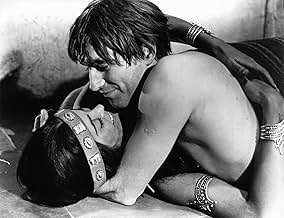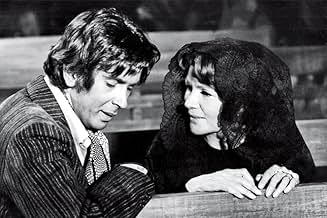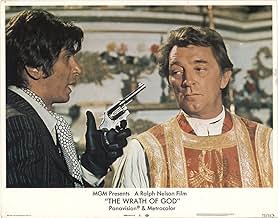IMDb-BEWERTUNG
6,0/10
1378
IHRE BEWERTUNG
Füge eine Handlung in deiner Sprache hinzuSet in the 1920s, several foreigners held by a South American military group are offered possible freedom if they accept to topple a local crazed military leader.Set in the 1920s, several foreigners held by a South American military group are offered possible freedom if they accept to topple a local crazed military leader.Set in the 1920s, several foreigners held by a South American military group are offered possible freedom if they accept to topple a local crazed military leader.
Gregorio Acosta
- De la Plata's henchman
- (Nicht genannt)
Empfohlene Bewertungen
The Wrath Of God is a kind of parody on the films Robert Mitchum was so routinely cast in back in the Forties and Fifties and even later on which he was doing know for a good paycheck. It's funny in spots, but ultimately doesn't quite come off.
Humphrey Bogart's The Left Hand Of God is the closest comparison one can make to this film. Bogart is also an adventurer in priestly disguise who aids a Chinese village during Kuomintang China days.
The Wrath Of God has Mitchum as a priest who is also a conman and handy with a variety of weapons, particularly the Thompson submachine gun. He, Victor Buono and Kenneth Hutcherson form an alliance of convenience which wasn't easy with Buono and Hutcherson refighting all the recent troubles in Ireland.
They get impressed into service by a strutting Colonel played by John Colicos whose behavior and that of his troops doesn't inspire a whole lot of confidence that Colicos's bunch are the good guys. Colicos has to get inside the stronghold of a wealthy Don played by a young Frank Langella in one of his earliest films. Colicos is no prize, but Langella is positively psychotic, especially on the subject of religion. In his domain he's forbade the Catholic Church and any of its priests from any practice of the religion. He's got his reasons, but they're kind of out in left field to say the least. Mitchum's convincing guise a priest might just draw him out.
The Wrath Of God marked the final screen appearance of Rita Hayworth who got the film as an act of charity by Mitchum according to the Lee Server biography of Mitchum. Hayworth was having financial problems and was drinking heavily. Little did anyone realize that the reason for her bad behavior which occasionally got reported in the press back then was the onset of Alzheimer's Disease. The woman was drinking literally because she was losing her mind. She caused a lot of production delays. A truly sad end to the woman who in my humble opinion was the greatest screen sex goddess of all.
What delays Rita Hayworth didn't cause Ken Hutcherson did with an accident which injured his arm and the insurance had to pay big bucks. The film was delayed by several weeks while Hutcherson healed and as Server put in his book, the insurance company wound up owning the film.
They didn't wind up owning Gone With The Wind.
Humphrey Bogart's The Left Hand Of God is the closest comparison one can make to this film. Bogart is also an adventurer in priestly disguise who aids a Chinese village during Kuomintang China days.
The Wrath Of God has Mitchum as a priest who is also a conman and handy with a variety of weapons, particularly the Thompson submachine gun. He, Victor Buono and Kenneth Hutcherson form an alliance of convenience which wasn't easy with Buono and Hutcherson refighting all the recent troubles in Ireland.
They get impressed into service by a strutting Colonel played by John Colicos whose behavior and that of his troops doesn't inspire a whole lot of confidence that Colicos's bunch are the good guys. Colicos has to get inside the stronghold of a wealthy Don played by a young Frank Langella in one of his earliest films. Colicos is no prize, but Langella is positively psychotic, especially on the subject of religion. In his domain he's forbade the Catholic Church and any of its priests from any practice of the religion. He's got his reasons, but they're kind of out in left field to say the least. Mitchum's convincing guise a priest might just draw him out.
The Wrath Of God marked the final screen appearance of Rita Hayworth who got the film as an act of charity by Mitchum according to the Lee Server biography of Mitchum. Hayworth was having financial problems and was drinking heavily. Little did anyone realize that the reason for her bad behavior which occasionally got reported in the press back then was the onset of Alzheimer's Disease. The woman was drinking literally because she was losing her mind. She caused a lot of production delays. A truly sad end to the woman who in my humble opinion was the greatest screen sex goddess of all.
What delays Rita Hayworth didn't cause Ken Hutcherson did with an accident which injured his arm and the insurance had to pay big bucks. The film was delayed by several weeks while Hutcherson healed and as Server put in his book, the insurance company wound up owning the film.
They didn't wind up owning Gone With The Wind.
It's a revolutionary central American country in 1920s. Oliver Van Horne (Robert Mitchum) is dressed as a priest. Irishman Emmet Keogh (Ken Hutchison) buys a ticket to anywhere to escape the growing unrest but it gets stolen. He encounters men loyal to revolutionary leader Colonel Santilla (John Colicos). He tries to rescue mute native girl Chela from them only to get strung up and then they're both rescued by Van Horne. They are captured by Santilla. The two imprisoned men and immoral gunrunner Jennings are recruited to assassinate his opponent Thomas De La Plata (Frank Langella) who is using a mine for his war chest. Rita Hayworth plays De La Plata's mother.
This has the Peckinpahesque violence like shooting a kid in the back. It's like a spaghetti western. The motivations are a little clunky. There are some compelling characters although Hutchison may not be leading man material. His looks is more towards villainous henchman. It's also notable for being Hayworth's last film. Her role is very much supporting and most compelling for the name. The Mexican location is great and the local colors are enticing. This is a fine B-movie.
This has the Peckinpahesque violence like shooting a kid in the back. It's like a spaghetti western. The motivations are a little clunky. There are some compelling characters although Hutchison may not be leading man material. His looks is more towards villainous henchman. It's also notable for being Hayworth's last film. Her role is very much supporting and most compelling for the name. The Mexican location is great and the local colors are enticing. This is a fine B-movie.
Not everyone agrees that this a parody. I have read that the film turned out confusing because of problems on the set. Including, Rita Hayworth's Alzheimer's and an actor who had a part for the first six weeks of filming. He was severly injured and couldn't complete his part properly. Therefore the confusion. Everyone wanted to just forget the whole thing but they released it anyway. All wasn't lost however, I personally found it very unique and intriguing. And as a Mitchum fan a rare, wonderful find on the classic movie channel.
To some extent Ralph Nelson's "The Wrath of God" spoofs westerns, but like Nelson's "Lilies of the Field," under the comedy is, I think, a deeply felt belief in divine grace. Both movies focus on unlikely human materials having a vocation they fail to recognize and consciously resist. Herein, Robert Mitchum plays a con man masquerading as a priest and a Catholic martyr in the tradition of Thomas à Becket or Thomas More mistaken by many as a hedonist.
In her last screen performance Rita Hayworth has preternaturally red hair (fire-engine red, not a color of any natural human hair), few lines, and is required to look devout (which she manages to do). As her flamboyantly traumatized and traumatizing son, Frank Langella gets to chew up the scenery, which he does with great relish (before "Dracula," after his memorable film debut in "Diary of a Mad Housewife" and Mel Brooks's adaptation of "The Twelve Chairs"). Ken Hutchinson does fine as the token normal guy who is embroiled in others' plots, including the romantic subplot that involves him with a mute Indian maiden (Paula Pritchett). In a Sidney Greenstreet-kind of role as a corpulent and corrupt gun-runner Victor Buono is suitably droll. Still, it is Mitchum's movie, and he is as compelling when he takes his priestly role seriously as when he plays the usual disengaged but competent existentialist who expects nothin' from nobody. <bt><br> A motley gang of foreign mercenaries getting involved in the confusions of the long-running Mexican revolution and taking a side against their financial interest recurred in a number of late-1960s and early-70s movies, including "The Wild Bunch", "The Professionals", and "A Fistful of Dynamite." The latter two use considerable humor within the genre of expatriates taking sides (which in Mexican settings of different eras includes "Vera Cruz", "Old Gringo", and "Bring Me the Head, of Alfredo García").
In her last screen performance Rita Hayworth has preternaturally red hair (fire-engine red, not a color of any natural human hair), few lines, and is required to look devout (which she manages to do). As her flamboyantly traumatized and traumatizing son, Frank Langella gets to chew up the scenery, which he does with great relish (before "Dracula," after his memorable film debut in "Diary of a Mad Housewife" and Mel Brooks's adaptation of "The Twelve Chairs"). Ken Hutchinson does fine as the token normal guy who is embroiled in others' plots, including the romantic subplot that involves him with a mute Indian maiden (Paula Pritchett). In a Sidney Greenstreet-kind of role as a corpulent and corrupt gun-runner Victor Buono is suitably droll. Still, it is Mitchum's movie, and he is as compelling when he takes his priestly role seriously as when he plays the usual disengaged but competent existentialist who expects nothin' from nobody. <bt><br> A motley gang of foreign mercenaries getting involved in the confusions of the long-running Mexican revolution and taking a side against their financial interest recurred in a number of late-1960s and early-70s movies, including "The Wild Bunch", "The Professionals", and "A Fistful of Dynamite." The latter two use considerable humor within the genre of expatriates taking sides (which in Mexican settings of different eras includes "Vera Cruz", "Old Gringo", and "Bring Me the Head, of Alfredo García").
Remarkably funny western/revolutionary action pic stars Mitchum as a con artist who poses as a priest and Langella as the South American' dictator he and his friends have been blackmailed into assassinating. Hayworth appears briefly as Langella's tormented mother.
The action is fast and well staged, and the film's humor is so effective that it has often been seen (mistakenly, I believe) as a spoof of its genre, rather than as the fine example it is of the genre at its best. This whole line of reasoning bothers me, because it implies that an adventure movie can't be funny, that it has to take itself deadly serious. Much like "Duck, You Sucker!" this film's irreverent humor is one of its main ingredients, but it does not detract from its standing as a decent action flick. It's in fact closer to the way action pictures are made today -- I would question whether the critics and fans who see this as a "parody" also think that Schwartzenegger's "Commando" and "The Running Man" are also parodies?
As Mitchum's character becomes more involved with Langella's peasant village, giving them the sacrament because they haven't seen a priest in years, he begins to BECOME the priest of his con-game, but his actions keep his friends and Langella guessing as to the extent of his "conversion." This brings up the theme of the appearance becoming the reality, an unusual theme for a western action flick.
Good performances and an unusually good film results.
The action is fast and well staged, and the film's humor is so effective that it has often been seen (mistakenly, I believe) as a spoof of its genre, rather than as the fine example it is of the genre at its best. This whole line of reasoning bothers me, because it implies that an adventure movie can't be funny, that it has to take itself deadly serious. Much like "Duck, You Sucker!" this film's irreverent humor is one of its main ingredients, but it does not detract from its standing as a decent action flick. It's in fact closer to the way action pictures are made today -- I would question whether the critics and fans who see this as a "parody" also think that Schwartzenegger's "Commando" and "The Running Man" are also parodies?
As Mitchum's character becomes more involved with Langella's peasant village, giving them the sacrament because they haven't seen a priest in years, he begins to BECOME the priest of his con-game, but his actions keep his friends and Langella guessing as to the extent of his "conversion." This brings up the theme of the appearance becoming the reality, an unusual theme for a western action flick.
Good performances and an unusually good film results.
Wusstest du schon
- WissenswertesThis was Rita Hayworth's last completed movie. She had difficulty remembering her lines. The crew believed it was because of alcohol abuse, but only later did they realize they were seeing the early stages of her Alzheimer's condition. Fittingly, it was one of the few times after becoming a star that she played her actual heritage.
- PatzerWhen Paula Pritchett's character, Chela, is cutting down Ken Hutchinson's character, Emmett, from the chandelier he starts to drop before the rope separates and the separation is at a different spot than she was cutting.
- VerbindungenFeatured in Robert Mitchum: Hollywoods Bad Boy (2018)
- SoundtracksGloria
from "Misa Criolla"
Music by Ariel Ramírez
Lyrics by Alejandro Mayol, Jesus G. Segade and Osvaldo Carena
Top-Auswahl
Melde dich zum Bewerten an und greife auf die Watchlist für personalisierte Empfehlungen zu.
- How long is The Wrath of God?Powered by Alexa
Details
Box Office
- Budget
- 2.500.000 $ (geschätzt)
Zu dieser Seite beitragen
Bearbeitung vorschlagen oder fehlenden Inhalt hinzufügen

Oberste Lücke
By what name was Zum Teufel mit Hosianna (1972) officially released in India in English?
Antwort






























